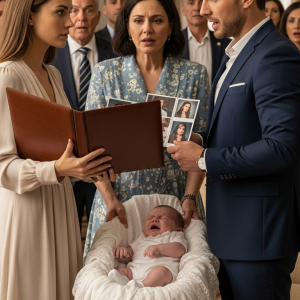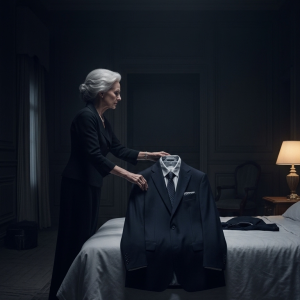The city was asleep, but Maria was not. At 3 a.m., her world was the sterile, echoing silence of an empty office building. The smell of industrial-grade cleaner clung to her clothes, and the rhythmic hum of her floor buffer was the only sound for miles. This was her second life, a secret she had kept for six long years. A life that began when her other one ended for the day.
By 6 a.m., she would peel off her blue janitorial uniform in the cramped locker room, her back and hands aching with a familiar, deep-seated weariness. She would drive home in her beat-up sedan as the sun began to rise, shower, and transform. She would put on her crisp, white nursing scrubs, the faint scent of antiseptic replacing the smell of bleach. By 8 a.m., she was Nurse Maria, a pillar of calm and compassion at the city clinic, her exhaustion hidden behind a practiced, gentle smile.
Her son, Daniel, knew nothing of this second life. To him, his mother’s perpetual fatigue was simply a “symptom of old age,” a sign that she “wasn’t taking care of herself.”
Daniel’s world, by contrast, was one of bright lights and sharp suits. He was a rising star at a prestigious financial firm, a life he had built on a carefully constructed narrative of fierce independence. He lived in a sleek, minimalist apartment with his fiancée, Tiffany, a woman whose pedigree was as flawless as her diamond ring. Daniel’s favorite story, the one he told at cocktail parties and repeated to Tiffany’s influential parents, was his origin myth.
“I put myself through Wharton,” he would say, a confident, easy smile on his face. “Full scholarship, worked three jobs. Graduated top of my class without a single penny of debt. In this day and age, that’s the real American dream, right?”
It was a brilliant story. And it was a complete lie.
This morning, as Maria drove home from her night shift, she thought of the letter that had arrived in the mail yesterday. It was on thick, official letterhead from the Department of Education. Inside, a single sentence had made her sixty-hour work weeks and sleepless nights worthwhile: “We are pleased to inform you that the student loan for Daniel Miller has been paid in full.” One hundred and fifty thousand dollars. Erased. After six years, her secret work was finally done. She was free.
Thanksgiving at Maria’s house was a study in contrasts. Her home was small, humble, but impeccably clean and filled with the warm, inviting smells of roast turkey and cinnamon. The table was set with her best, mismatched china, a testament to a life of making do.
Tiffany’s family, the Harringtons, arrived like visiting royalty. Mr. Harrington was a self-made real estate mogul, a man whose handshake was firm and whose gaze was appraising. Mrs. Harrington was draped in cashmere and quiet judgment. Tiffany, beautiful and polished, tried to bridge the gap between her world and her fiancé’s, her bright chatter only highlighting the uncomfortable silence.
Daniel, however, was in his element. He played the part of the dutiful son who had risen above his humble beginnings. He guided the Harringtons through the small house, his commentary a subtle apology for its lack of grandeur. He was performatively attentive to his mother, all while subtly distancing himself from her world. He was ashamed. Ashamed of the small house, the working-class neighborhood, and the quiet, simple woman who had raised him.
The tension simmered beneath the surface of polite conversation. Mr. Harrington, a man who respected hard work above all else, tried to engage Maria in conversation about her nursing career. Daniel quickly steered the topic back to his own recent promotion. Tiffany complimented Maria on her cooking, then immediately launched into a story about a Michelin-star restaurant they had recently visited.
Maria endured it all with a quiet, unreadable grace. She was a gracious host, her smile never faltering. But inside, a profound sense of disillusionment was beginning to crystallize. The exhaustion she felt wasn’t just from her two jobs; it was from the emotional weight of her son’s carefully constructed world, a world in which she was becoming an inconvenient, embarrassing footnote.
As dessert was served, Daniel stood up, tapping his glass for attention. He had the look of a man about to assume a mantle of great responsibility. He placed a proprietary hand on Tiffany’s shoulder.
“I’d like to make a little announcement,” he began, his voice imbued with a somber, mature tone. “As Tiffany and I begin to build our future together, we’ve been making some important financial decisions. And we’ve decided that it’s time for Mom to become a little more… independent.”
He looked at Maria, his expression one of a parent explaining a difficult but necessary truth to a child. “Starting next month, we will no longer be covering the mortgage payments on this house.”
A thick silence fell over the table. Mrs. Harrington’s eyebrows shot up. It was Mr. Harrington who broke the silence, his voice a low rumble. “Why is that, son? I was under the impression you were doing quite well.”
Daniel puffed out his chest, embracing the role of the pragmatic, self-made man. “We are, sir. Which is why it’s time to focus on our own family. To be perfectly honest,” he continued, his voice dripping with condescension, “I’ve been supporting Mom for years now. It’s a drain on our resources. And frankly, she never really did anything to support my career. This is… tough love, you could say. It’s time I stopped enabling her.”
The insult, so casually delivered, was breathtaking in its cruelty. She never really did anything to support my career. The words hung in the air, a monument to his ignorance.
Maria looked at her son. She felt no anger, no surge of tears. All she felt was a vast, empty canyon of disappointment. The boy she had sacrificed everything for was gone. In his place was this stranger, a man so blinded by his own reflection that he couldn’t see the truth right in front of him. The truth she had carried for six years. The truth that was about to be set free.
Without a word, Maria slowly folded her napkin and placed it on the table. She stood up, her movements calm and deliberate. The entire table watched her, a silent, tense audience.
“If you’re finished, Daniel,” she said, her voice quiet but carrying an astonishing weight, “then I have a few things I’d like to share with the family as well.”
She walked out of the dining room and returned a moment later with a thick, worn manila file folder. She placed it on the table directly in front of her son, next to his half-eaten pumpkin pie. The sound of the folder hitting the polished wood was as loud as a gunshot in the silent room.
“You’re right about one thing, honey,” she said, her gaze steady. “You have been helping with the mortgage for a few years. And I am genuinely grateful. It gave me the breathing room I needed to finally pay off this last, very large debt. For you.”
With a steady hand, she opened the folder. She slid the first document across the table. “Here is the original student loan agreement from the Wharton School of Business. For one hundred and fifty thousand dollars. That’s your signature, isn’t it, Daniel?”
Daniel stared at the paper, his face starting to lose its color.
Maria slid out another stack of papers, secured with a paperclip. “Here are my pay stubs from my full-time job as a registered nurse for the past six years.”
She then pulled out a second, thicker stack. “And here,” she said, her voice dropping slightly, “are my pay stubs from my second job. The one I worked from midnight to six in the morning, cleaning office buildings downtown. Also for the past six years.”
Tiffany let out a small, horrified gasp. Mr. Harrington leaned forward, his eyes narrowed, studying Daniel’s ashen face.
Maria saved the final document for last. She placed it gently on top of the pile, a single, crisp sheet of paper. “And this,” she said, her voice clear and final, “is a letter from the Department of Education. It’s dated last week. It’s a confirmation that your one-hundred-and-fifty-thousand-dollar debt has been paid. In full.”
She looked around the table, from the horrified faces of the Harringtons, to the disgusted look on Tiffany’s face, and finally, to her son. The self-made man. The boy who graduated without a penny of debt. He was completely, utterly silent, his carefully constructed world lying in ruins around him, shattered by a stack of pay stubs and the quiet, undeniable truth.
The destruction was instantaneous and absolute. Daniel sat speechless, his face a ghastly shade of white. The architecture of his entire identity had just been demolished in front of the one audience he had built it to impress. He was not a self-made man; he was a subsidized man. His success wasn’t a testament to his own genius; it was a monument to his mother’s silent, back-breaking sacrifice.
Mr. Harrington was the first to move. He stood up, throwing his napkin onto the table with a look of pure, unadulterated contempt for Daniel. “Maria,” he said, his voice a low growl, but his eyes, when he looked at her, were filled with a profound respect. “Thank you for a lovely dinner. I believe it’s time for us to go.” He didn’t even glance at Daniel as he and his wife walked out.
Tiffany remained, her face pale, her eyes glistening with tears of fury and humiliation. She looked at the man she was supposed to marry, this stranger who had built their entire relationship on a foundation of lies. She slowly, deliberately, slid the enormous diamond ring off her finger and placed it on the table beside the file folder. “We’re done, Daniel,” she whispered, her voice choked with disgust. Then she, too, turned and walked away.
Daniel was left alone at the table with his mother, surrounded by the ruins of his life. The silence was no longer tense; it was a gaping, unbridgeable void. He couldn’t look at her. He couldn’t speak. He had not only been exposed as a liar, but as a fool, and worst of all, as an ungrateful son who had tried to discard the very person who had secretly handed him the world.
Maria did not need Daniel’s help anymore. She had fulfilled her final, unspoken duty as a mother. The very next day, she called the cleaning company and told them she was quitting her night job. That first night of uninterrupted sleep in six years was the most profound luxury she had ever known.
With the house paid off and her secret burden lifted, Maria began a new chapter. She rediscovered the simple joys that her double life had stolen from her. She had time to read, to garden, to meet friends for coffee. She enrolled in a pottery class at the local community center, her hands, so used to giving injections and scrubbing floors, now finding a new joy in shaping clay.
A few weeks after that disastrous Thanksgiving, she received an unexpected visitor. It was Mr. Harrington. He came not with his daughter, but alone. He apologized for his family’s role in the painful evening and then made her an offer that stunned her.
“Maria,” he said, his tone respectful. “I run a charitable foundation that helps single parents and low-income families navigate medical crises. It needs a director of patient advocacy. Someone with integrity, compassion, and a firsthand understanding of what it means to struggle. I can’t think of anyone more qualified than you.”
It wasn’t an act of pity. It was an act of recognition. He was offering her a job she not only deserved, but one that would give her life a new, profound sense of purpose.
Her relationship with her son was shattered, perhaps irrevocably. Daniel had tried to call, sending rambling, pathetic text messages full of excuses and pleas for forgiveness. Maria knew it would be a long time, if ever, before that wound could be healed. But as she stood in her sunny garden, her hands covered in soil, a future of peace and purpose stretching out before her, she felt a sense of profound freedom. She had not, as her son claimed, “done nothing.” She had done everything. And now, finally, her life was her own.




